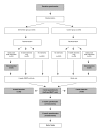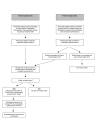Can a disease-specific education program augment self-management skills and improve Health-Related Quality of Life in people with hip or knee osteoarthritis?
- PMID: 17134516
- PMCID: PMC1693560
- DOI: 10.1186/1471-2474-7-90
Can a disease-specific education program augment self-management skills and improve Health-Related Quality of Life in people with hip or knee osteoarthritis?
Abstract
Background: Patient education and self-management programs are offered in many countries to people with chronic conditions such as osteoarthritis (OA). The most well-known is the disease-specific Stanford Arthritis Self-Management Program (ASMP). While Australian and international clinical guidelines promote the concept of self-management for OA, there is currently little evidence to support the use of the ASMP. Several meta-analyses have reported that arthritis self-management programs had minimal or no effect on reducing pain and disability. However, previous studies have had methodological shortcomings including the use of outcome measures which do not accurately reflect program goals. Additionally, limited cost-effectiveness analyses have been undertaken and the cost-utility of the program has not been explored.
Methods/design: This study is a randomised controlled trial to determine the efficacy (in terms of Health-Related Quality of Life and self-management skills) and cost-utility of a 6-week group-based Stanford ASMP for people with hip or knee OA. Six hundred participants referred to an orthopaedic surgeon or rheumatologist for hip or knee OA will be recruited from outpatient clinics at 2 public hospitals and community-based private practices within 2 private hospital settings in Victoria, Australia. Participants must be 18 years or over, fluent in English and able to attend ASMP sessions. Exclusion criteria include cognitive dysfunction, previous participation in self-management programs and placement on a waiting list for joint replacement surgery or scheduled joint replacement.Eligible, consenting participants will be randomised to an intervention group (who receive the ASMP and an arthritis self-management book) or a control group (who receive the book only). Follow-up will be at 6 weeks, 3 months and 12 months using standardised self-report measures. The primary outcome is Health-Related Quality of Life at 12 months, measured using the Assessment of Quality of Life instrument. Secondary outcome measures include the Health Education Impact Questionnaire, Western Ontario and McMaster Universities Osteoarthritis Index (pain subscale and total scores), Kessler Psychological Distress Scale and the Hip and Knee Multi-Attribute Priority Tool. Cost-utility analyses will be undertaken using administrative records and self-report data. A subgroup of 100 participants will undergo qualitative interviews to explore the broader potential impacts of the ASMP.
Discussion: Using an innovative design combining both quantitative and qualitative components, this project will provide high quality data to facilitate evidence-based recommendations regarding the ASMP.
Figures
References
-
- Lorig K, Lubeck D, Kraines RG, Seleznick M, Holman HR. Outcomes of self-help education for patients with arthritis. Arthritis Rheum. 1985;28:680–685. - PubMed
-
- Lorig K, Fries JF. The Arthritis Helpbook. 6th. Cambridge, Da Capo Press; 2006.
-
- Lorig KR, Sobel DS, Stewart AL, Brown BW, Jr., Bandura A, Ritter P, Gonzalez VM, Laurent DD, Holman HR. Evidence suggesting that a chronic disease self-management program can improve health status while reducing hospitalization: a randomized trial. Med Care. 1999;37:5–14. doi: 10.1097/00005650-199901000-00003. - DOI - PubMed
-
- Lorig K. Patient education: a practical approach. 3rd. Thousand Oaks, Sage Publications; 2001. p. xvi, 246.
Publication types
MeSH terms
LinkOut - more resources
Full Text Sources



